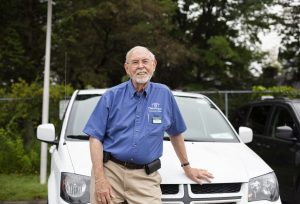
MHARI SHAW/STAFF PHOTOGRAPHER
Once, during his 21-year-career driving entertainers, lecturers and students to and from Chautauqua Institution, Bill Brockman had dinner with Rita Moreno.
Earlier that night, the actress and her husband had arrived at Buffalo Niagara International Airport, where Brockman picked them up. Moreno was gracious, but there was one problem: The Athenaeum Hotel’s restaurant would be closed by the time they completed the approximately hour-and-a-half ride back to the grounds. Brockman suggested he wait outside in the car while Moreno and her husband dined at the Watermark Restaurant in Mayville, but Moreno had a better idea.
“She said, ‘No, why don’t you come in and have dinner with us? ’ ” Brockman recalled. “So I had an evening with Rita Moreno and her husband, which was quite nice.”
Brockman and his wife, Maggie, first visited Chautauqua in 1959, returning with their family in 1968. In the years that followed, they would spend two or three weeks on the grounds before spending their first full summer at Chautauqua in 1998. Maggie auditioned for the Motet Choir — a goal of hers ever since her first encounter with the group nearly four decades earlier — leaving Brockman to, as he joked, “(attend) 3,000 lectures, read 4,000 books and hear 18 symphony concerts.”
“That’s obviously an exaggeration, but it felt like I had done all that,” he said. “I told my wife, ‘I can’t be here all summer. I have to have a job.’ I just threw that line out to her and she said, ‘Well, get a job.’ ”
Fortuitously, the next day’s issue of The Chautauquan Daily featured an appeal for more drivers. Brockman responded to the call after the season had ended, interviewed with then-head driver, Suzanne Brandon, and began driving in 1999. Two decades later, at the end of the 2019 season, Brockman will retire as head driver and one of the Institution’s foremost representatives.
A former minister and psychotherapist, Brockman has long held positions that require being “sensitive to people.” In the context of his driving career, such a sensitivity means being attuned to the signals passengers give. Do they want to engage in conversation, or review their manuscript and answer emails in silence?
Deborah Sunya Moore, vice president of performing and visual arts, emphasized the importance of the ambassadorial aspects of being a driver — a driver is, in many cases, “the person who has the opportunity to create a first experience about Chautauqua.” When Brockman offered his resignation last year, in part because he was driving less, Moore and the transportation team asked him to stay on another year precisely because “he was still an ambassador.”
Over the course of his tenure, Brockman has picked up the Rev. Jesse Jackson, his “civil rights hero” — as well as driven Ahmed Kathrada, a South African politician who was imprisoned alongside Nelson Mandela. While Brockman described his interaction with Jackson as a “be careful what you wish for” situation — after Brockman coordinated around a cancellation and drove through driving rain, Jackson failed to speak to him for the entire ride — he called Kathrada “one of the most gentle, loving men (he) had ever encountered.”
Because Kathrada could not walk between venues due to a case of gout, Brockman served as his personal transportation, leaving time for him to ask the activist how he could endure 26 years in prison without becoming bitter.
“He said, ‘We were determined not to let the guards dehumanize us, and we went to all religious activities that the prison allowed,’ ” Brockman said, quoting Kathrada. “ ‘It didn’t matter what faith or what it was — we all went as a way of experiencing some solidarity with one another.’ That was a very touching moment for me.”
For Ron Kellner, who just completed his 12th year driving for the Institution, Brockman leads from experience. Inside an unpredictable schedule of 2 a.m. wake-up calls, delayed flights and round-trip commutes that Brockman estimates add up to “easily four hours” per trip, an “esprit de coeur” prevails.
“Bill leads us with grace and dignity,” Kellner said. “He’s just a super guy who takes the interest of the drivers at heart because he was a driver himself, and he knows the issues we face. He was always great about presenting (our concerns) to the people above us and resolving whatever issues we had. It’s made 12 years terrific.”
Thanks to Brockman’s role as host at the Hall of Missions, John Jackson knew of the head driver before he himself began driving in 2006. Dave Shideler, whose father started the driving program in 1967, began driving under Brockman’s leadership in 2004.
“He has always maintained a great reputation with everyone who has met him,” Shideler said, citing the growth of a “very well-respected” group of drivers. “I don’t know that you would ever find anyone who would not say a nice word about Bill.”
“I credit him with establishing very high standards of performance and commitment on behalf of the whole crew of drivers, thus resulting in very good representation for the Institution,” Jackson said. “He’s a man of integrity.”
When Shideler wanted to take a part-time job during the season, Brockman permitted it. When Shideler suffered from sepsis, Brockman and his wife, Maggie, visited him because, in Shideler’s words, “he cared.”
“He is a very caring person and a good listener,” Shideler said. “He explains things with a humanistic touch, and has given me a lot of solid advice. I can’t say enough about his empathy — his true understanding of empathy.”
Gordon Wahlgren started driving the same summer as Brockman, when they were two of only eight drivers for the Institution. Wahlgren described Brockman as “one of his favorite Chautauqua people” — a “calming force” who inspires all drivers to be “flexible, patient and to treat passengers as very honored guests.”
“If something is going to go wrong, it will go wrong,” Wahlgren said, remembering a time Brockman had to fetch Frank Sinatra in time for his Amphitheater performance amidst confusion about whether the singer was ready to go. “It’s a real pleasure seeing him and Maggie when I’m dropping people off at the Hall of Missions. They are always there waiting to greet us, no matter what time of the night or early morning.”
During their weekly drivers’ meetings, Wahlgren sits next to Brockman, and they often visit with each other when they’re not working. When Wahlgren’s wife was first placed in a memory care facility, Wahlgren turned to Brockman for support and understanding.
“He’s been a mentor for me,” Wahlgren said. “I look forward to seeing him every day. Just being with Bill and Maggie certainly adds to my life every summer.”
Brockman’s job has evolved since he first joined the driving team in 1999, matching the growth of the Institution. The number of trips have increased, fewer drivers live on the grounds, and now the travel coordinator in the Performing and Visual Arts Office, currently Judy Dunn, schedules assignments — a task formerly reserved for the head driver. Through it all, Brockman found a “gratifying” camaraderie with his fellow drivers.
“They are all, in my opinion, just remarkable people,” he said. “And they are seriously dedicated to Chautauqua. They go beyond being drivers, really.”
Brockman is, according to Moore, “the epitome of what it is to be an ambassador” — for the Institution, but also “in life.”
“He is kind, and I will miss him greatly, as he has guided me through the early years of my time at Chautauqua,” she said.
Although Brockman said that it is “certainly time to retire,” he will miss it.
“It’s not a job,” he said. “I don’t know how to describe it. I’m from the world of religion — it’s like a calling. If it were just a job, it doesn’t pay enough. The hours are terrible. You don’t do it for the money. The drivers help to make Chautauqua work. We help it to fulfill its mission.”




